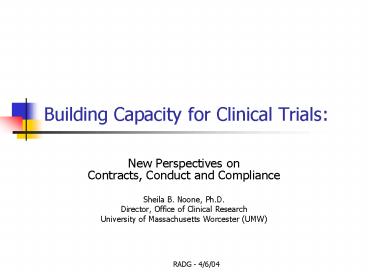Building Capacity for Clinical Trials: - PowerPoint PPT Presentation
1 / 20
Title:
Building Capacity for Clinical Trials:
Description:
Demand for new technologies and devices that decrease hospital stays. Desire for improved surgical innovation and minimally-invasive procedures ... – PowerPoint PPT presentation
Number of Views:41
Avg rating:3.0/5.0
Title: Building Capacity for Clinical Trials:
1
Building Capacity for Clinical Trials
- New Perspectives on Contracts, Conduct and
Compliance - Sheila B. Noone, Ph.D.
- Director, Office of Clinical Research
- University of Massachusetts Worcester (UMW)
2
Three objectives
- Summarize trends that will influence scale and
complexity of clinical trials in Academic Health
Centers (AHC) - Emphasize critical components for building
capacity in AHCs that ensure safe, ethical and
reliable conduct of clinical research - Highlight institutional re-engineering _at_ UMW
necessary to achieve success re contracts,
conduct compliance (work in progress!)
3
Central Message
- For improved health and QOL, we must create more
efficient processes for translating scientific
discovery innovation into clinical trials - and
ultimately into clinical practice - Requires collaboration from multiple stakeholders
and a major shift in how we interact, negotiate
and partner for successful implementation of
clinical trials
4
Converging trends
- Incredible advancements in scientific knowledge
- but concern that there are not tangible human
benefits - Acknowledgement of shift in disability due to
chronic disease (chronic behaviors) - An aging baby boom population
5
Converging trends
- Demand for new technologies and devices that
decrease hospital stays - Desire for improved surgical innovation and
minimally-invasive procedures - Demand for minimally invasive diagnostic tools
(e.g., virtual colonoscopy)
6
Converging trends
- Emerging power of nanotechnology nanomedicine
- Convergence of medical devices and
pharmaceuticals (drug-coated stents, needles and
pumps to regulate insulin, transdermal
diagnostics and drug delivery systems)
7
Converging trends
- New focus from NIH and AAMC on importance
academic-industry partnerships - NIH Roadmap new pathways to discovery research
teams of the future re-engineering of clinical
research enterprise - http//nihroadmap.nih.gov
- AAMC recent task force formed to promote
networks of collaboration, rather than singular
competing efforts from institutions sponsor
industry-AHC meetings and workshops
8
Building capacity
- Capacity-building requires examination of
interventions that develop the abilities,
behaviors, relationships and values that enable
an organization to carry out complex tasks - Central are notions of time, human resources,
management of change and most important,
sustainability
9
Building capacity for clinical trials
- Critical components include
- Understanding institutional priorities
- Initiating faculty discussions (dept. chairs)
- Clinical Research Advisory Committee
- Tend to relationship between stakeholders (e.g.,
medical school and clinical system) - Honestly examine current infrastructure metrics
10
Building capacity Shared responsibilities
- Examining study feasibility is most important
step in study initiation - history with sponsor/CRO
- protocol assessment
- Study valuable? Well-designed? Ethically
acceptable? Inclusion/exclusion criteria
reasonable? - If investigator-initiated, subcontracting to
other institutions? PI as sponsor
11
Building Capacity
- Study feasibility (continued)
- study population
- Access? Competing with other studies?
Cross-department cooperation? Community
recruitment? Advertising? - Realistic enrollment estimates??????
- Realistic enrollment period? Recruiting non-
English speaking subjects? Access to professional
translation services? - Are you recruiting vulnerable subject?
12
Building capacity
- Study feasibility (continued)
- Site resources
- Time the study requires? Adequate staff? Workload
manageable for present staff? - Coordination, regulatory burden
- Staff trained in GCPs? Study-specific procedures?
Will sponsor train? - If inpatient, will non-study staff need
in-service?
13
Building Capacity
- Study feasibility (continued)
- Site resources equipment and facilities
- Adequate space?
- Equipment on-siteor provided by sponsor?
- Secure and adequate record storage?
- Remote data entrywill sponsor train? provide
laptop? - Almost all these issues influence study contract
and study conduct
14
Clinical Research/Trial Agreements
- Re-engineering contract process _at_ UMW
- Increasing scale of clinical trials
- Increasingly complex contract terms more
attention to GCP regulatory obligations - New database to track contract process
- Requires collaboration of research administrator,
investigator, IP legal office
15
CRA/CTA
- Often contentious contract terms
- Intellectual property
- Publication
- Indemnification
- Subject Injury
- New Resource from AAMC
- Clinical Trial Contracts A Discussion of
- Four Selected Provisions www.aamc.org
16
Study Conduct
- Eye-opening to audit sampling of clinical trials
QI program since 2002 - Results of QI program drive the education and
training efforts - Although PI is ultimately responsible for all
study conduct, institutional liability for poorly
performed studies is high
17
Study Conduct
- Most deficits with study conduct and lack of
adherence to GCP standards relate to confusion
about roles and responsibilities (some relate to
inattention to process) - Good Clinical Practice (GCP) training is helpful
in ensuring attention to detail - UMW instituted two-day GCP training for CRCs on
quarterly basis in 2003 - investigators more
difficult
18
Building Capacity for Clinical Trials Lessons
Learned
- Competitive nature of industry trials makes
efficiency in contract process essential but
not at expense of careful review - Approach each CRA/CTA as long-term relationship
- Well-trained workforce (appropriate to the
complexity of trial) is the most important asset
for GCP adherence
19
Lessons Learned
- A central support-oriented office can be pivotal
in promoting safe, ethical reliable conduct of
human subjects research - Dedicated space to conduct studies may enhance
both GCP standards and efficiency (Clinical
Trials Unit opening mid-2004) - Dont promise what you cant deliver applies to
investigators and institutions
20
Most important lesson
- If an institutions goal is to promote and
support clinical research growth, it must assume
greater responsibility for ensuring a dynamic,
responsive infrastructure.































